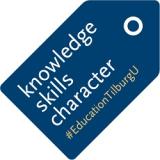You learn that there’s nothing wrong with failing
Critically reflecting on the meaning of success in our society, learning how to cope with setbacks and talking about stress and failure with fellow students and teachers. It can help you and make you feel less alone. That is what Franziska Fröhlich, a third-year Liberal Arts and Sciences student, experienced when she participated in the Resilience Project. “It is very nice that everyone talks so openly about their failing experiences”.
Research showed that students are faced with a high, sometimes even too high, pressure to perform. Partly due to that, a significant percentage of students face mental health issues. That is why University College Tilburg designed and implemented the Resilience Project.
The project consists of lectures and sessions in which students learn about failure, success and resilience and are offered tools to practice resilience. There is also room for students, alumni, staff members and professors to share their failing experiences. Franziska Fröhlich was one of the students who participated in the Resilience Project. We speak with her about her experiences.
Why did you participate in the Resilience Project?
“In my first year we had a couple of mandatory classes about failure and resilience in general. For example, we talked about historical figures that failed in what they wanted to do, and how that failure brought them somewhere else. Most of the subsequent sessions were voluntary. One of our teachers convinced me and my friends to go to the first session. After that we just kept joining. It was such a nice feeling that also students you don’t really know that well tell something personal. You get to know them and it makes the community closer.
You learn something and you don’t feel as alone with your problems.
What did you find difficult and pleasant about this experience?
“Since the events are about failing or resilience, there’s always this sense of ‘Do I want to talk about this? Is it becoming too personal?’ Even though we have those sessions very often, there still seems to be a fear of talking about something negative about oneself, especially for first year students or people who join for the first time. This makes it difficult sometimes.
However, the whole experience of not being alone in those issues was nice. The experience of someone else voicing what you’re thinking. If someone tells that they failed a test, didn’t get into a study or still don’t know what their Master’s going to be, you just feel understood somehow, since I usually only tell my closest friends. That makes it very pleasant to be there because you know there’s a circle of trust.”
What about the project will you take with you?
“We talked about coping strategies and about what you can do when you have a setback, which was very interesting. The lecturer showed us a whole list of coping mechanisms and I could just see myself in those lists. We talked about which of those mechanisms were healthy and how you can turn your unhealthy ones into better ones. Now I try to do this. I have some thesis deadlines and I’ve been trying to have those healthier habits when facing a setback. I think that’s something that I’m going to take with me: the awareness about what I do and what I could do instead.
Another aspect I will take with me is the awareness that everyone deals with those things. Having more personal conversations with people you don’t really know, hearing stories about their coping mechanisms and how they feel – it makes me aware that everyone goes through those things. So, if I start working somewhere, I won’t be as annoyed if someone’s not on time or isn’t t finishing something, and maybe I could offer help instead.
It’s about understanding how you can help someone instead of putting them down even more.
Do you think that a project like this belongs in a Bachelor’s program?
“I definitely think so, especially in a Bachelor’s program. There are students around 17 or 18 years old that start their Bachelor’s. Then the first exams come around, which are a lot different than high school exams, and they might fail a class. That can feel incredibly lonely and sad: it’s the first thing you do on your own and then you fail at it. If you have this project around it and your teachers from the first moment start normalizing academic failure, it just makes it easier to start this new chapter.
I hope Tilburg University tries to implement these kinds of projects into other Bachelor’s programs.
This story is a good example of the Tilburg Education Profile, which is built around three pillars: Knowledge, Skills and Character. By teaching students how to cope with failure and stress, they build characters and skills that contribute to society. Want to know more about the Resilience Project? The story and information behind it can be found in these youtube videos.

